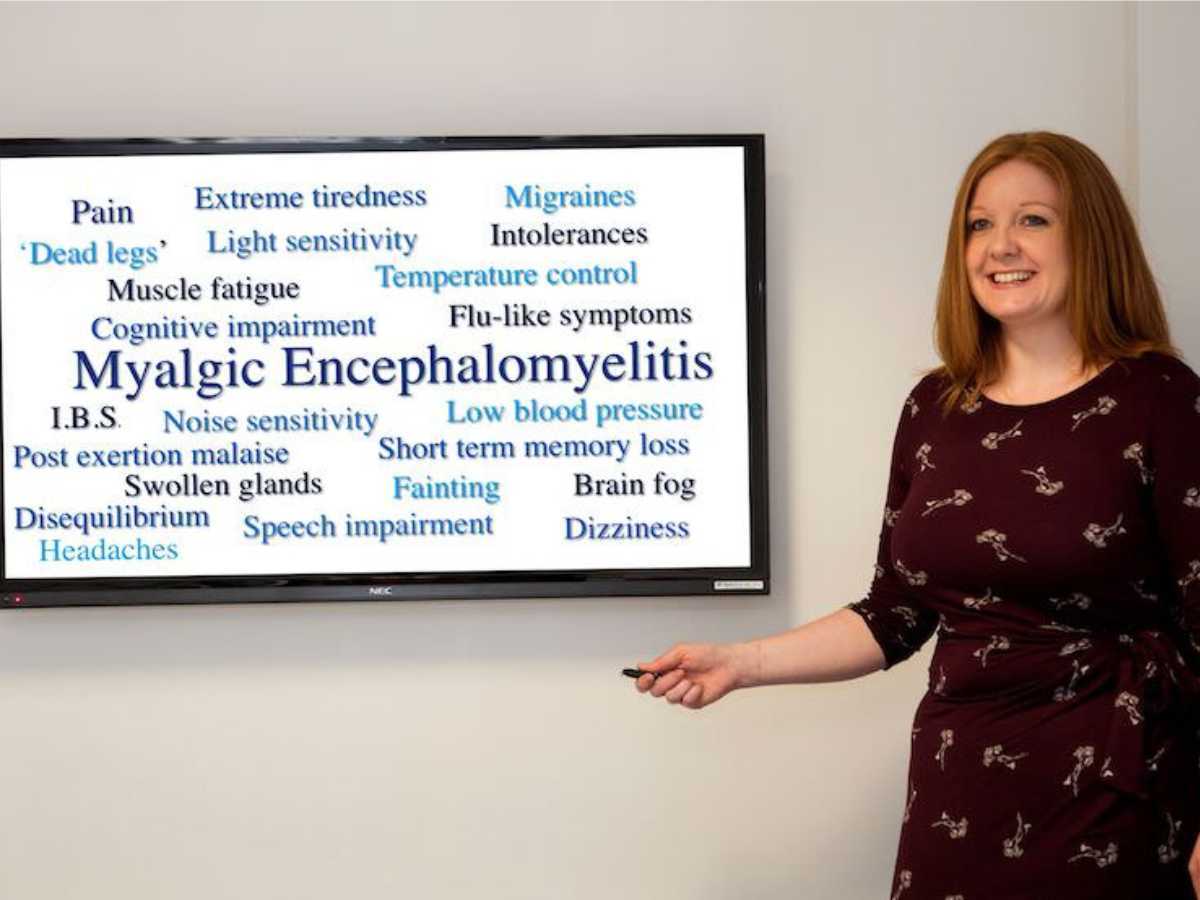As part of the Canary and the Chronic Collaboration’s Amplify training programme, founder of ME Foggy Dog and Stripy Lightbulb CIC Sally Callow writes for us on her 10 years of advocacy and campaigning around myalgic encephalomyelitis (ME).
The year 2014 is memorable for a number of reasons. It was the year the Malaysia Airlines Flight 370 disappeared, the Ebola epidemic became a global health crisis, Russia did a ‘land grab’ of Crimea, and two comedy powerhouses – Robin Williams and Joan Rivers – died. And at the same time, I became a campaigner for the myalgic encephalomyelitis (ME/CFS) community. My lived experience of ME informs every aspect of my advocacy and campaign work.
While the scientific community has made medical advances in diseases like multiple sclerosis (MS) and Parkinson’s disease, it hasn’t taken any significant steps forward with ME. In my decade of campaigning, I have witnessed this firsthand and felt varying degrees of frustration at the difference.
Steps in the right direction
As part of the ME/CFS community, I am used to celebrating the reduction of harm rather than medical breakthroughs. We fight to have harmful ‘treatments’ withdrawn rather than rejoice over new drug discoveries.
The ME NICE guideline (2021) is the most well-known example. Graded exercise therapy (GET) and cognitive behavioural therapy (CBT) were acknowledged as potentially harmful for people living with ME. But this only came after people with the disease campaigned with minimal energy.
We simply asked NICE to ‘follow the science’, rather than a flawed debunked research trial. Oh, how we celebrated the guideline publication.
The 2021 NICE guideline provides the basics on how to reduce the possibility of harm. It’s an imperfect compromise but an improvement on what went before.
However, our joy was short-lived. To this day non-adherence is widespread within the NHS. Was this ‘progress’? People living with the disease are still having to fight not to be harmed by the medical profession.
This non-adherence was entirely predictable and is why I started my Shake It UP campaign in Autumn 2021.
Shaking up ME/CFS
I am campaigning for a system to report harms from non-pharmaceutical treatments. Patient communities, including ME/CFS, have nowhere to report harm from any ‘treatment’ that is not pharmaceutical or a device.
I knew anecdotally, through years of advocacy and thousands of conversations, that many patients had been harmed by GET/CBT and had reported the harm to the appropriate healthcare provider/organisation. Yet, during the NICE review, it was claimed there had never been any reports of harm.
Complaints and reports of harm had been dealt with in-house by the NHS and were never collated or counted. Appropriate reporting systems are necessary, for ME and other illnesses, where cheap ‘cost-effective’ non-pharmaceutical ‘treatments’ are the NHS go-to.
No one seems to want to take responsibility for the harm caused to some patients by non-pharmaceutical ‘treatments’.
The Medicines and Healthcare products Regulatory Agency (MHRA) stated:
these types of treatments fall outside the remit of the MHRA.
The Department of Health and Social Care (DHSC) has repeatedly told me that GET and CBT are no longer issues for the ME community because ‘NICE no longer recommends’ these as ‘treatments’ for ME. However, these ‘treatments’ are still suggested to this day in GP surgeries and ‘CFS clinics’ in England (and the rest of the UK).
The pandemic and reduction of harms
The past four years have been about reducing harm from the pandemic. I and many others did all we could to highlight the possibility that Covid-19 could cause an ME/CFS-like illness – and it doesn’t please me to know that we were correct.
It is now known that around 50% of long Covid cases meet ME diagnostic criteria.
Then came the fight for ‘vulnerable group’ status for people with our disease – something that was never achieved. This is unsurprising given many in medicine still think ME is psychosomatic.
This false belief links to why ME was not included in The Joint Committee on Vaccination and Immunisation (JCVI) ‘at risk’/group six list for shielding and vaccine priority, even though it is scientifically known that we have issues with our immune systems.
It also should be said that people living with ME are at risk of vaccine side effects and vaccine harms. Too many have either experienced a worsening of ME severity or have a range of new symptoms or conditions that were caused by vaccination.
The JCVI did not factor in these implications. It did not consider ME patients to be at risk from external factors such as vaccinations or viruses. But in reality, we risk being harmed by both.
Further to all of this, why haven’t scientists made breakthroughs for ME?
Progress for comparable diseases
Diseases that affect predominantly females are tarnished by medical sexism and misogyny. Both ME/CFS and MS have been known as ‘Female Hysteria’.
Sometimes it feels like a daily fight to be believed, as we are often told the illness is ‘all in our heads‘ or we are hypochondriacs and malingerers. This is partly why it takes a long time for the condition to be acknowledged as valid, and for progress to be made in research. For ME, the label ‘female hysteria’ has been hard to shift.
MS has only been taken seriously in recent decades thanks to the MRI machine. It’s impossible to deny the existence of a physical biological disease when it is visible on a scan. MRIs were first used for MS in 1983. Thanks to this, MS shrugged off the label of ‘female hysteria’.
So, the ME community now needs its own ‘MRI moment’.
In 2024, those living with MS have clinical trials platform Octopus. Scientists have designed Octopus to test multiple treatments at the same time, and analyse data throughout the course of the trial. This level of forward-thinking is not happening in the ME space. However, there are discussions of linking up with the Octopus platform shortly due to overlaps between the two conditions.
Stem cell research advances in MS and Parkinson’s disease are exciting. It is wonderful to see just how far medicine has come in terms of previously heavily stigmatised and misunderstood diseases.
These advances give me hope. Those living with MS and Parkinson’s disease still have a long way to go. However, there has been much to celebrate in a short space of time. I can only dream of the day that equivalent treatments for ME are considered a serious possibility.
What of ME/CFS?
Disease Modifying Therapies (DMTs) are being used in the treatment of MS. As Gal Bitan has explained:
Acknowledging that no cure is available, neurologists prescribe “Disease-Modifying Therapy” (DMT) to reduce the frequency, severity, and residual disability of relapses… Of the various categories, relapsing-remitting MS is the most amenable to treatment.
Given that ME/CFS is a fluctuating disease, I hope DMTs have a place in the future of ME.
But it is not a stretch to say that people living with ME have nothing.
It is difficult to get a clinical diagnosis of ME due to the poor knowledge base on the disease within the medical profession. Most people walk into their GP’s office with the false assumption that whatever is wrong is treatable and they will get better in time – or at least be able to manage symptoms with medication.
That is not the case with ME. This is in part, due to the gross underfunding of ME research for decades. As Steve Topple wrote for the Canary in 2018:
funding per patient, per year for MS was £82.20 versus an economic disease burden of £20,000. For people living with M.E, it was £4.40 versus £13,200 respectively.
When compared to other illnesses and conditions such as chronic renal failure, lung/breast/colon cancers, stroke, and rheumatoid arthritis, research has found that people with ME have the lowest quality of life.
I can dream
ME is not an insignificant disease.
As a patient and campaigner, I know the gains made in ME research are small.
I find it angering and upsetting. Are we not worthy of a medical breakthrough?
I feel frustration in every fibre of my being, every single day.
Comparing progress made in ME with that of MS and Parkinson’s reinforces the sense of injustice. I am sure MS campaigners endured the same sense of injustice for decades before their big MRI breakthrough.
But how many more decades will I be banging my head against the immovable brick wall that is government research funding allocation?
How much longer will I be holding my head in my hands with the NHS’s seemingly immovable and rigid structure and processes?
When will the medical profession move into the 21st century and tackle its misogyny and sexism in its own workforce?
My campaigning continues, so that when I reach that next milestone, the government, the NHS, and clinicians will take ME seriously and treat it equitably at long last.
Featured image via Stripy Lightbulb CIC




